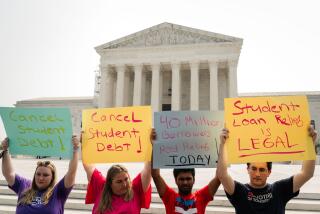High Court to Rule on Lawyer Liability in Failed S&Ls; : Thrifts: The government is seeking to recover bailout losses, claiming attorneys should have exposed wrongdoing.
- Share via
WASHINGTON — The Supreme Court agreed to decide whether the federal government can force lawyers for failed savings and loans to pay damages for not exposing insider wrongdoing.
The court said Monday that it will hear arguments by Los Angeles law firm O’Melveny & Myers that it should not be held liable for work it performed for a California thrift that later collapsed.
The Federal Deposit Insurance Corp. manages hundreds of failed savings institutions as part of the government’s massive bailout of the industry. As part of its effort to recover losses, the FDIC is pursuing $1.5 billion in claims that insider wrongdoing--often aided by outside lawyers and accountants--contributed to the collapses.
Federal appeals courts have issued conflicting rulings on the FDIC’s power to seek such damages.
The government took over American Diversified Savings Bank in February, 1986, and sued the thrift’s top officers, contending they concealed the thrift’s precarious financial situation. American Diversified, based in Costa Mesa, was liquidated in 1988.
O’Melveny & Myers prepared documents to promote two real estate syndication deals offered by American Diversified in 1985. After the FDIC took over the thrift and received complaints from investors, it decided those offerings were misleading and the money was refunded.
The government filed a separate lawsuit against O’Melveny & Myers in 1989, accusing the firm of professional negligence and seeking to recover money the thrift lost because of the canceled deal.
A federal judge dismissed the lawsuit, noting that the investors were repaid and saying O’Melveny & Myers owed no duty to anyone else.
The U.S. 9th Circuit Court of Appeals reinstated the case last year, saying law firms also must protect their clients from liability for false or misleading offerings to investors.
The appeals court said that when the FDIC takes over a failed financial institution, past wrongdoing by insiders does not bar the government from filing lawsuits in an attempt to recover losses.
In the appeal acted on Monday, lawyers for O’Melveny & Myers said the 9th Circuit Court’s ruling is “fundamentally misguided” and a “transparent attempt to locate an additional ‘deep pocket’ ” to cover the federal cost of the S&L; bailout.
American Diversified could not have sued the law firm because its own officers were involved in wrongdoing, and the FDIC “inherits the rights and liabilities of the entity it has taken over,” O’Melveny’s attorneys said.
State law, not a federal rule, should govern the relationship between lawyers and clients, the firm’s lawyers said.
Justice Department lawyers said the 9th Circuit Court was correct. But they agreed that the high court should consider the case to resolve a conflict with another federal appeals court.
In another business-related case, the Supreme Court refused Monday to stop states from regulating the way managed health care systems choose doctors and hospitals.
The court let stand a Virginia law under attack by the insurance industry, which contended that such state regulation is preempted by a federal law protecting employee benefits.
The Virginia law is aimed at regulating preferred-provider organizations--health care systems in which more than 50 million Americans participate.
The state law would probably become irrelevant if President Clinton’s health care proposal became law, experts said.
More to Read
Inside the business of entertainment
The Wide Shot brings you news, analysis and insights on everything from streaming wars to production — and what it all means for the future.
You may occasionally receive promotional content from the Los Angeles Times.










